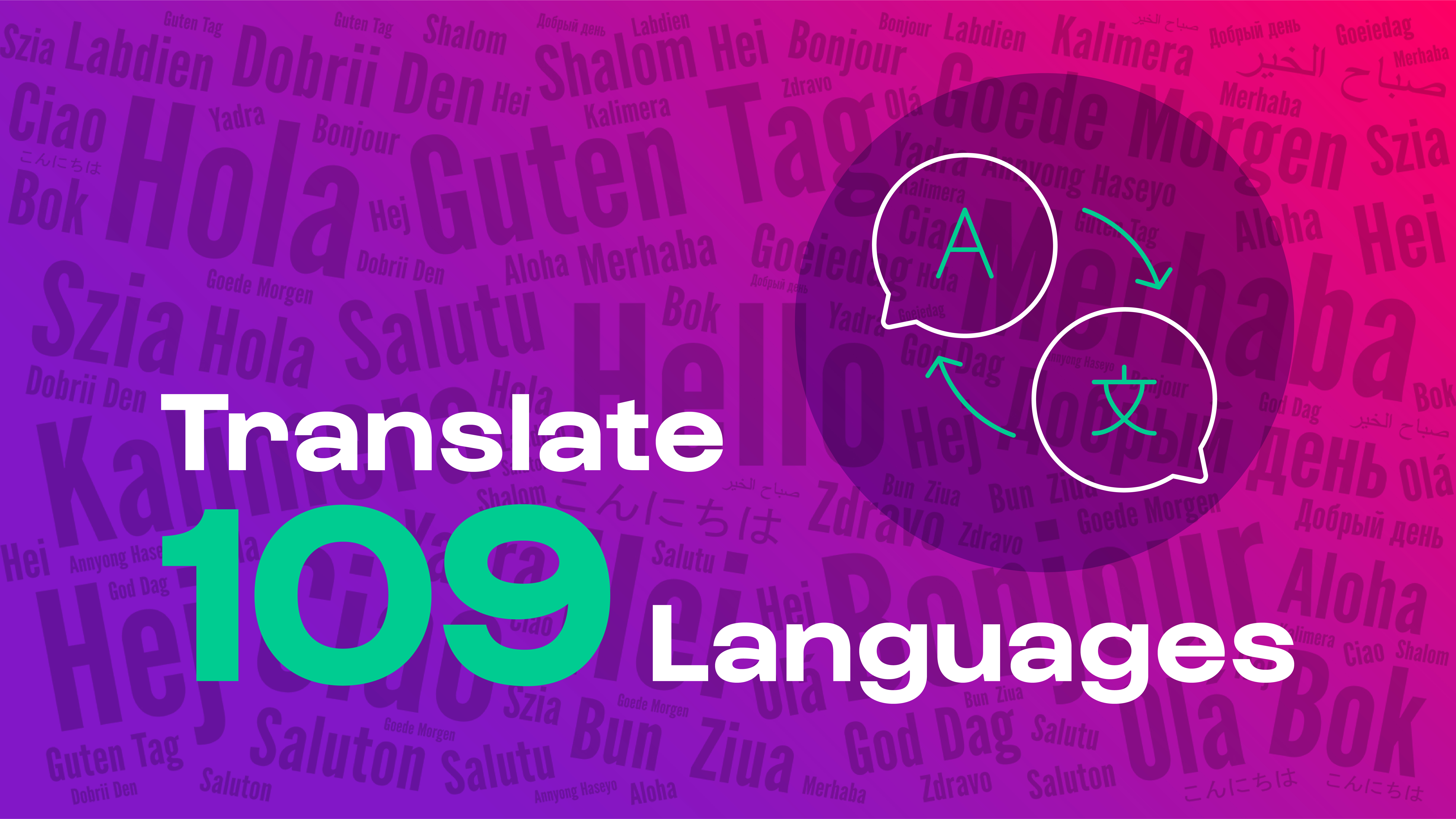
Nothing is more frustrating than needing help and the person who can offer you help doesn’t understand what you are trying to say. Unfortunately, this happens all too often, especially in healthcare – and it will likely persist as population diversity in the U.S. continues to increase. This isn’t a new phenomenon, either; the share of non-English speakers in the U.S. has been rising steadily for decades. In fact, 68 million people – over 20% of the U.S. population – spoke a language other than English at home in 2019, up from 23.1 million people in 1980. This is why multilingual support is critical across all industries today.
Implications of language barriers in healthcare
It’s reported that 67% of limited English speakers note language as a barrier to accessing care in the U.S. What’s more, according to a recent 2022 national study, over 77 million Americans today have difficulty accessing healthcare services and obtaining quality care due to low levels of health literacy.
[“Health literacy is…the degree to which individuals have the capacity to obtain, process, and understand basic health information and services needed to make appropriate health decisions.”
Ratzan and Parker, 2000, vi.
When language used in healthcare is difficult to understand, it can create barriers for patients to access the care they need, ultimately impacting the quality and cost of care. Several studies have shown that patients who face language barriers have poorer health outcomes compared to patients who speak the local language. Several risk factors manifest in routine communication failures, such as instructions for medication or follow-up care questions. Combined with lower health literacy, these patients also tend to postpone communications with providers and have difficulty maintaining consistent medical histories, among a number of other issues.
Meeting patients on their terms is no longer an option – it’s a necessity
For those patients who tend to postpone communications, they may be uncomfortable communicating verbally via phone; however, they may be more proficient in reading and responding through digital means such as texting or email. In our recent report, The State of Clinical Support Staff, it’s clear that the way providers communicate with patients continues to be a challenge, with many failing to meet patients on their terms. A whopping 76% of clinical support staff report their healthcare organization struggles to communicate with some patients in their preferred language, and 63% believe communicating with patients only via phone creates unnecessary barriers for patients from lower income levels, those from underserved populations, and patients who speak English as a second language.
In the best case, the patient’s healthcare needs are non-acute and there is more time to work through language barriers or find an interpreter. In the worst-case scenario, there is a critical need for timely and accurate communication to ensure the right actions can be taken. Needing healthcare can be stressful enough, add on top the inability to communicate what you need and understand the information that is being provided to you — this increases patient stress, frustration, and anxiety, often resulting in poor patient engagement and experience. This can also pose challenges in terms of maintaining patient safety, as well as achieving high levels of satisfaction among both medical professionals and patients.
This can be further exasperated when a parent is receiving information about their child. At Artera, we often see multiple patients associated with the same contact number. This often occurs when a parent is receiving information on behalf of a minor. In this case, if their preferred language is not used, healthcare quality for the child may be impacted due to a lack of understanding of the required action. When at home, it’s not possible to call in an interpreter to help translate and support staff are not always bilingual to be able to explain verbally. A new study, published in JAMA Pediatrics, surveyed patients and families at pediatric units in 21 hospitals and found that those with limited English proficiency had significantly lower odds of freely speaking up, questioning decisions, and being unafraid to ask questions. Had these patients and families had multilingual support, they may be more inclined to speak up and ask questions.
Overall, research has shown that when the patient and provider do not speak the same language, the results are worse health outcomes, reduced access to health information, and decreased satisfaction with care. These experiences can lead to poor patient trust and a tendency to disengage with the medical institution, including primary care — potentially leaving patients to access higher-acuity care in place of low-acuity care management, which can be quite costly.
A Step Forward: Breaking down language barriers to deliver a better patient experience
The patient experiences described above are in direct conflict with our mission to make healthcare #1 in Customer Service. When a patient needs care, communication is a critical component of the patient experience. By engaging a patient in their preferred language and channel, they can communicate and understand more effectively, thus reducing confusion, stress, and errors.
We’re pleased to take another step forward in our mission by acknowledging the importance and need for multilingual support in our software. Customers now have the ability to communicate with patients in 109 languages, including right-to-left language requirements of Arabic and Hebrew.
Providers and their support staff will be able to apply these languages across all communication mediums available in Artera including text messages, emails, broadcasts, automations, phone calls, and campaigns. For the 85% of clinical support who believe that communicating with patients in their preferred language will improve healthcare access overall, we stand with you and will continue striving to improve the patient experience for all.
Work Smarter, Not Harder: Automate Processes, Use Preferred Languages and Seamlessly Include Translators
Tackling language barriers is a skill that requires practice and the implementation of effective patient-communication processes. While the path forward may vary by health system, there are noted tactics to do so effectively.
While it’s not always possible to automate workflows, it’s a best practice to do so when appropriate. Through Artera Automations, common patient answers can be communicated in preferred languages to low English proficiency speakers with speed and ease. Automated workflows provide greater capacity to clinical and support staff, alleviating repetitiveness and anxiety when an interpreter might not be available.
Although automations can help free up staff, oftentimes human intervention is required to engage in specific or dynamic patient conversations — that’s why our platform seamlessly enables interpreters to get introduced to the conversation with a simple mention or notification. And with Artera, interpreters can relay patient responses directly to staff within a single communication thread.
Automation of workflows does not mean exclusion of interpreters. When effective patient communication processes are implemented, introducing interpreters to the conversation becomes a time-saving act.
Add Cultural Phrasing to Personalize the Patient’s Experience
Cultural-specific phrasing aids in personalizing the healthcare visit and journey for the patient, leading to greater satisfaction. For most health systems, that requires demonstrating empathy and ensuring patients have understood the communication via their body language.
It is common for low English proficiency patients to nod, even though they may not fully understand or grasp the situation that is being communicated to them. For virtual communications (text or email), it can be more difficult to convey medical complexities, jargon, or meanings of words that are specific to the English language.
With fully customizable responses in Artera, clinical support staff can easily determine the best verbiage, tone, and cultural-specific phrasing aids when creating Quick Responses, Broadcast Messages, and other communications.
Advancing Health Equity With Multilingual Support
When patients and providers are able to more easily connect through a diverse set of languages and methods, access, outcomes, and satisfaction are improved. This is especially advantageous for federally qualified health centers (FQHCs) and community health centers (CHCs) that serve more vulnerable, underserved, and diverse populations. By leveraging multilingual patient communication software, FQHCs and CHCs can address the unique needs of their communities, reaching more patients and driving more equitable care.
Kheir Clinic, an FQHC and one of Artera’s customers, experienced positive results using multilingual support during the pandemic. For the majority of Kheir’s patients, English is not their first language, as they primarily serve Korean, Thai, Spanish, and Bengali patients. During vaccine distribution, it was critical they figure out how to reach their patients in a timely manner that was both linguistically and culturally sensitive. Since many of their patients did not have access to accurate vaccine information or appointments in their native language, Kheir recognized their significance as a trusted resource for vaccine education. In addition to addressing the language barriers, they had to calm the concerns of their underserved patients such as lack of insurance, risks for undocumented immigrants, overall vaccine hesitancy, or lack of financial ability to pay.
Using criteria for who was first eligible for the vaccine, Kheir was able to segment that patient population in their EHR and use the Artera broadcast feature to send customized messages about vaccine appointments with an embedded link in three different languages. Patients clicked on the link which led to the Los Angeles County site to schedule vaccinations. Overall, Kheir successfully reached over 21,300 total unique patients and administered 12,522 vaccinations.
“Artera really streamlined the process for us to be able to reach a large community easily…Although technology can sometimes seem like a barrier for some people, especially in underserved areas, in this case, we were able to leverage Artera to get a good result.”
Shawn werve, vp, operations, kheir clinic
Why multilingual support is essential today
Artera’s extended language support offers automated outreach for over 100+ different languages to reach all patients and reduce language barriers. Automated appointment reminders in patients’ preferred languages increase accessibility to care, and more directly puts patients in contact with their care team. Additionally, appointment reminders reduce the number of steps for patients to connect with staff and allow them to interact over SMS just like they would with friends and family.
What’s more, addressing language barriers can reduce the utilization of costly services or procedures, including a decrease in emergency room visits and extraneous medical exams.
Health systems seeking to address this gray area have many resources at their disposal, but the variety of options available presents challenges in implementing effective processes. Artera supports health systems in tackling language barriers and approaches process improvements in a holistic manner that benefits both staff and patients alike.
Join us in our mission to make healthcare #1 in Customer Service. Enable your clinical support staff to connect with patients in their preferred language to improve patient communication and engagement.
Read more about multilingual support or download the multilingual support infographic.


